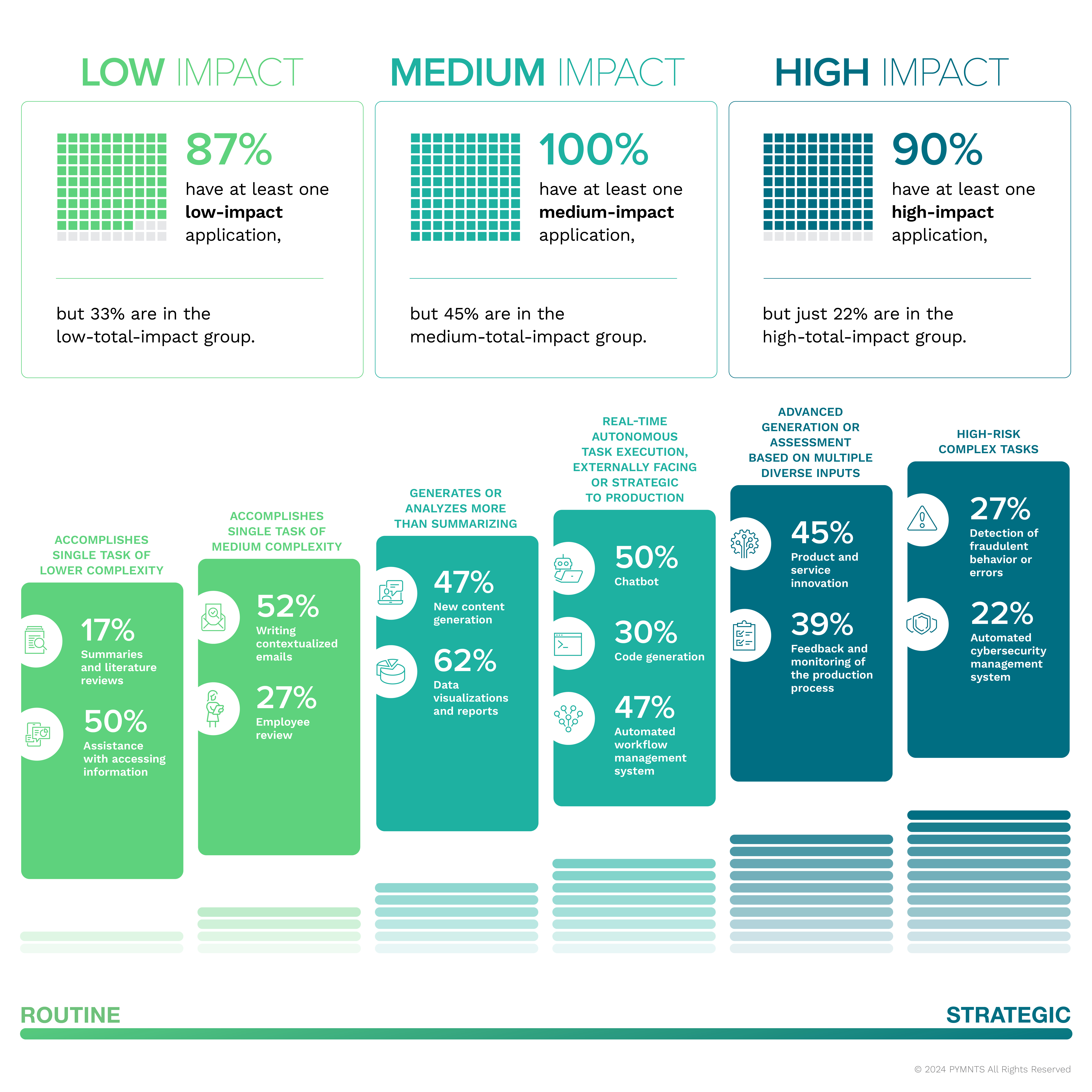Most CFOs surveyed from firms annually generating at least $1 billion in revenue report that implementing artificial intelligence (AI) remains critical for their strategic planning. As of June, firms are increasingly using generative AI (GenAI) for medium-impact tasks, such as financial reporting and data visualizations, surpassing the share using it for more routine tasks. That type of usage was the norm just a few months ago.
Yet despite this deeper integration, many CFOs report limited return on investment (ROI) from GenAI. Just 13% say the ROI from GenAI is very positive. Despite this, CFOs shared their commitment to investing in fully integrating the technology into their organizations in the near future.

While CFOs know AI’s potential, they may be slower in implementing it strategically, instead focusing on making routine tasks efficient.
These are just some of the findings detailed in “Most CFOs See Limited ROI From GenAI, but Boost Its Investment,” the fourth edition of PYMNTS Intelligence’s 2024 C(AI)O Project. This series offers a monthly recap of the players and innovators using AI to revolutionize how they manage critical parts of their businesses. This edition examines the CFOs’ evolving perceptions of GenAI, drawing on insights from 60 CFOs from U.S. firms that generated at least $1 billion in revenue last year, conducted from June 6 to June 14.
Key Findings
CFOs are increasingly using AI for medium-impact purposes — such as data visualizations and reports — suggesting that firms’ reliance on GenAI for strategic purposes is increasing.
The most common use of GenAI is for creating data visualizations or reports. Six in 10 CFOs surveyed say their companies use it for these types of medium-impact tasks. For this report, our analysis of how firms use the technology grouped 45% of firms into the medium-impact category. Firms grouped this way typically use GenAI applications for tasks of medium complexity. (For more details, see Figure 2.) This 45% share marks a notable shift in CFO GenAI use since March, when 35% of middle-market firms were in the medium-impact category. CFOs are now more likely to use GenAI for medium-impact tasks, suggesting they are becoming more familiar with it and using it more strategically.
Even as they continue to perceive the technology as important and effective in executing tasks and operations, CFOs view GenAI’s ROI less favorably than just a few months ago.
CFOs’ perceptions of AI’s importance for increasingly complex tasks have significantly evolved since our March survey. In June, CFOs were 86% more likely to say that GenAI is important for financial reporting than in March. And 58% of CFOs said the technology is important for capital management in June, compared to just 30% in March. The data suggests that CFOs have gained confidence in embracing the technology’s capabilities in just a short time.
Our survey shows that CFOs clearly view GenAI as fairly effective in task execution. These use cases can include generating reports or creating data visualizations. Further, CFOs consider GenAI increasingly important for operations. While they view GenAI’s capabilities with growing optimism, CFOs are less favorable about the actual ROI gained from GenAI. As of June, CFOs are less likely to report very positive ROI from GenAI. Just 13% did, down from a high of 27% just a few months earlier, in March.
Further, in June, 65% more CFOs said a limited ROI is a clear drawback to implementing GenAI in any part of their organization. The decline in ROI sentiment, coupled with related data, suggests that in the rush to innovate using a new technology, the fear of missing out may drive investment — with hopes of eventual profit, even if those hopes are dwindling.
All CFOs surveyed said their organizations will fully integrate GenAI, and more than 3 in 4 plan to significantly increase their GenAI investments in the coming year.
Despite the decline in firms reporting very positive ROI, GenAI is still firmly on the radar for CFOs. As of June, 78% of CFOs said they plan to increase their GenAI investments in the coming year. The average increase CFOs expect is nearly 10% (on an existing investment average of $3.16 million).
Firms with more positive ROI from GenAI are bolder with their investments. Middle-market firms experiencing very positive ROI are increasing their investments by 19% more than those with negligible ROI, who expect to increase investments by just 6.2%. The anticipated time it might take to fully integrate GenAI, however, varies. The CFOs that report negligible ROI anticipate taking around 15 years to fully integrate the technology, while those experiencing very positive ROI anticipate full integration by 2030.
Regardless of the investment, GenAI plays a critical role in the future of CFOs’ strategic and operational planning. In our March and June surveys, not one executive said their organization would “never” integrate the technology. The data implies that full integration of GenAI is inevitable as executives become more familiar with the technology and its capabilities — and continue their investments.
Conclusion
CFOs surveyed agree that continual investment in GenAI is critical to their firm’s strategic and operational planning. This is true even as fewer middle market firms consider the ROI from GenAI to have been excellent. In fact, CFOs reporting negligible ROI plan on increasing their GenAI investments by 6.2% in the coming year. The data also reveals an increasing trust in GenAI for more medium-impact tasks, such as generating financial reports, as CFOs become more familiar with the technology and its applications.
Methodology
“Most CFOs See Limited ROI From GenAI, but Boost Its Investment” is based on a survey of U.S. CFOs conducted from June 6 to June 14. The report explores the impact and perceptions of GenAI implementation for CFOs. Our sample included interviews with 60 CFOs from U.S. firms that generated at least $1 billion in revenue last year.
Read the previous edition of the 2024 CAIO Report Series “The Impact of GenAI on a COO’s Priorities,” for more.
